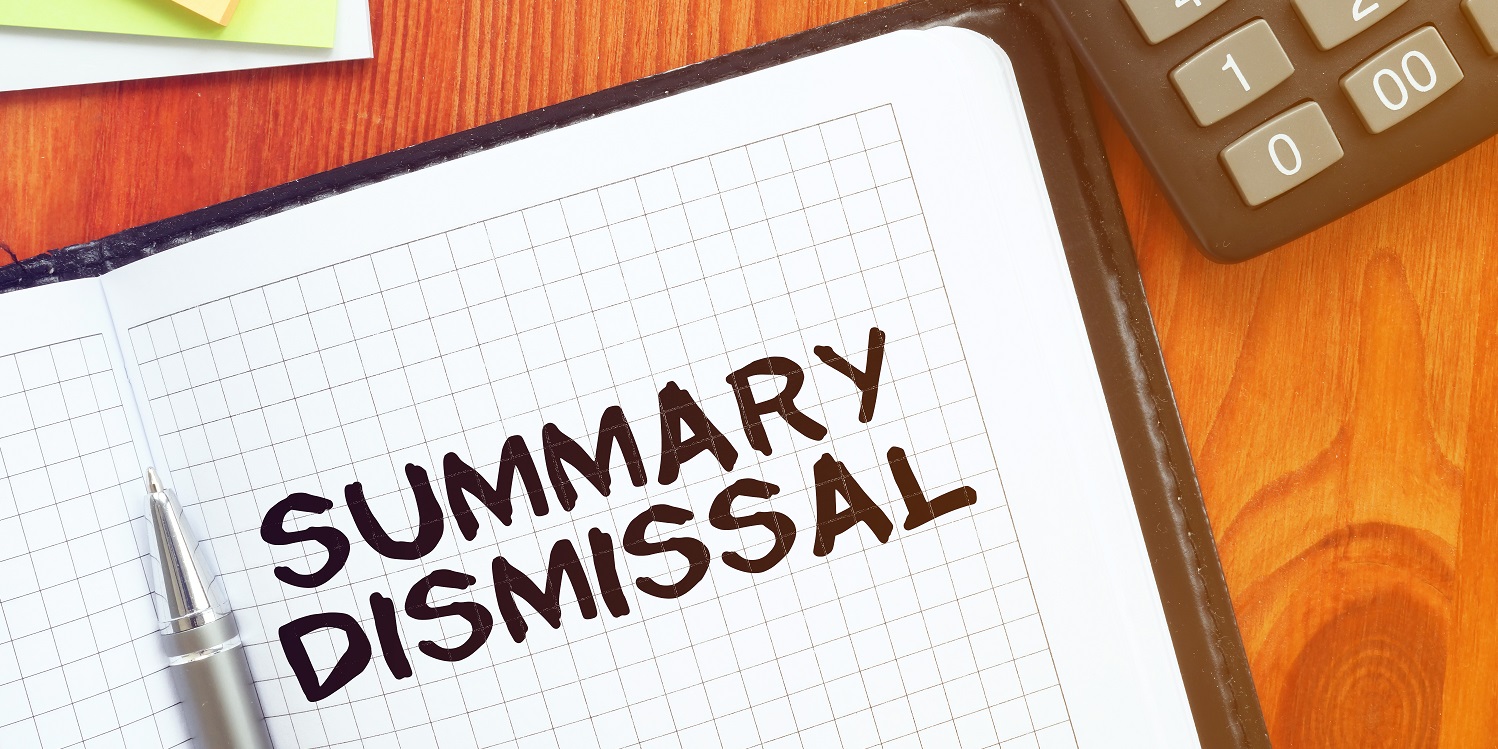What is summary dismissal and how can employers summarily dismiss an employee fairly and lawfully? Jennifer Smith, Partner at Forbes Solicitors LLP, explains how businesses can summarily dismiss staff following a fair process.
This article explains what summary dismissal is in the context of UK employment law and aims to provide a guide to employers in terms of the considerations and overall process to follow before summarily dismissing an employee following an allegation of misconduct.
A common misconception, as seen on TV programmes such as The Apprentice, is that an employer can fire an employee on the spot, without any investigation or process taking place. Depending on the circumstances and the level of service of an employee, this can lead to massive employment law risks for an employer (as outlined below).
Summary dismissal meaning
A summary dismissal is when an employer dismisses an employee without notice or payment in lieu of notice. Essentially, the dismissal is with immediate effect and is usually due to gross misconduct.
Gross misconduct (extremely serious misconduct) is considered to be a serious breach of contract that irreparably damages the working relationship and trust between the employer and employee. Whether the alleged misconduct is sufficiently serious to justify a fair summary dismissal will of course depend on the individual circumstances of the matter.
Although a summary dismissal is ‘instant’, it must follow the completion of a process which determines that a dismissal should be with immediate effect and is justified. This is particularly crucial if the employee has been employed for 2 continuous years or more or if there are discrimination issues (owing to a protected characteristic under the Equality Act 2010), which are likely to be relevant.
Examples of gross misconduct which warrant a summary dismissal will usually be found in an employer’s disciplinary policy and the policy should clearly outline examples that could warrant summary dismissal. Although the examples only serve as a guide, covering this under a disciplinary policy ensures that employees are aware of the standards expected and the implications if those standards are not met. Examples of what constitutes gross misconduct include:
- Theft
- Fraud, forgery, or other dishonesty
- Bullying or physical violence (including discrimination or harassment)
- Being under the influence of alcohol or illegal drugs
- Serious breach of health and safety rules
- Serious breach of confidential information or unauthorised use/disclosure of personal data
What are the potential employment law issues around summary dismissal?

Unfair dismissal
Where a summary dismissal takes place for an employee with 2 years’ continuous service or more, there is a risk of an ordinary unfair dismissal claim being pursued.
In a claim for ordinary unfair dismissal, the Employment Tribunal will look at two things:
- Was there a fair reason for dismissal? Here, conduct would be the fair reason (i.e. the employee’s alleged gross misconduct) and so (1) will be established.
- Was the disciplinary process followed, fair and reasonable in treating the potentially fair reason as a sufficient reason for dismissal?
Another factor to be mindful of is whether the sanction imposed falls within the range of reasonable responses, having regard to any evidence in support of mitigation.
Wrongful dismissal
Wrongful dismissal is a dismissal in breach of contract and this is commonly pursued by employees where the employer fails to pay any notice, or the correct level of notice.
Where a dismissal takes place, an employee would ordinarily be entitled to statutory or contractual notice pay, whichever is longer. Failure to pay notice would be deemed a breach of contract and an employee may pursue such a claim, irrespective of the employee’s length of service.
However, an exception to this is where the employee is found to have committed a repudiatory breach (gross misconduct), enabling the employer to terminate the employment relationship immediately.
It is important to note that a summary dismissal can be wrongful and unfair. It can also be wrongful but not unfair; the conduct in question may be deemed not sufficiently serious to amount to a repudiatory breach warranting summary dismissal. At the outset and during the process, an employer should therefore consider whether the allegation(s) do in fact constitute gross misconduct or whether it is less serious misconduct, which should be dealt with through the employer’s warning process.
How to have a fair summary dismissal procedure
- Refer to your existing disciplinary policy and procedure and ensure you have an independent person at each stage of the process (in order of seniority)
- Refer to the Acas Code of Practice on disciplinary and grievance procedures to ensure best practice and to mitigate risk if any claim is pursued as a result of a subsequent dismissal
- Suspend if appropriate and follow this up in writing
- Reasonably investigate the matter. Invite the employee to an investigation meeting (if appropriate)
- Invite, in writing, the employee to a disciplinary hearing
- Confirm, in writing, the outcome of the disciplinary hearing to the employee
Document disciplinary processes consistently and effectively with HR document management software.
In the outcome letter, you should include the following:
- Outline findings in relation to the allegation(s) and the reason(s) for the dismissal.
- The right to appeal the dismissal and to whom.
- The arrangements which now apply:
- e.g. The dismissal is immediate and therefore the employee’s final day of employment is [X] date
- The employee is not entitled to notice, or payment in lieu of notice
- Holiday entitlement (whether or not accrued) at the termination date
- How to return company property, when the final salary will be paid and any ongoing obligations by the employee which continue post-termination (such as confidentiality and/or restrictive covenants).
Key takeaways: make sure to follow a fair procedure before any dismissal, including summary dismissal. Ensure there are valid and justifiable grounds before proceeding with a summary dismissal.
Read more from the myhrtoolkit blog
Constructive dismissal: a guide for employers
Having protected and without prejudice conversations with employees
Unfair dismissal compensation: how much can it cost businesses?

Written by Jennifer Smith
Jennifer Smith is a Partner at Forbes Solicitors LLP, leading the Employment and HR Team for their Manchester office. She deals with all aspects of employment law, advising and assisting private sector clients, from local SMEs to large multinational companies. Jennifer has particular expertise in the digital and e-commerce sectors, as well as the hospitality and retail sectors.


 Holiday Planner
Holiday Planner Absence Management
Absence Management Performance Management
Performance Management Staff Management
Staff Management Document Management
Document Management Reporting
Reporting Health and Safety Management
Health and Safety Management Task Management
Task Management Security Centre
Security Centre Self Service
Self Service Mobile
Mobile



